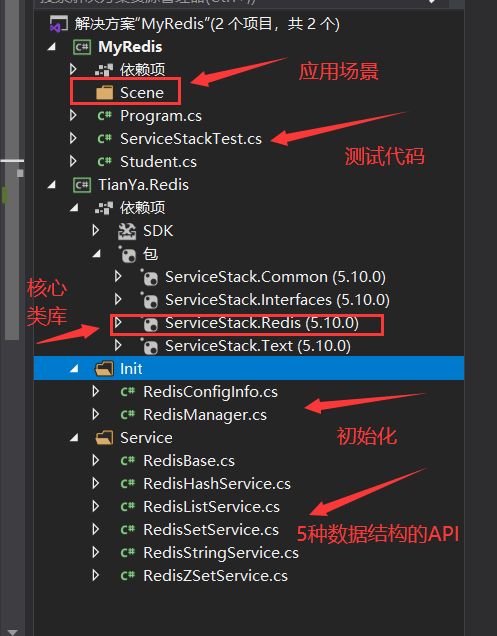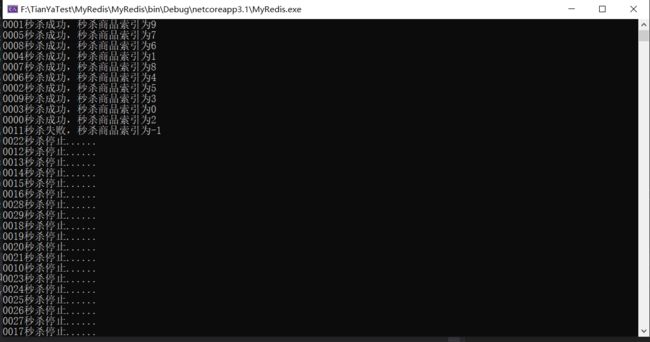本系列将和大家分享Redis分布式缓存,本章主要简单介绍下Redis中的String类型,以及如何使用Redis解决订单秒杀超卖问题。
Redis中5种数据结构之String类型:key-value的缓存,支持过期,value不超过512M。
Redis是单线程的,比如SetAll & AppendToValue & GetValues & GetAndSetValue & IncrementValue & IncrementValueBy等等,这些看上去像是组合命令,但实际上是一个具体的命令,是一个原子性的命令,不可能出现中间状态,可以应对一些并发情况。下面我们直接通过代码来看下具体使用。
首先来看下Demo的项目结构:
此处推荐使用的是ServiceStack包,虽然它是收费的,有1小时3600次请求限制,但是它是开源的,可以将它的源码下载下来破解后使用,网上应该有挺多相关资料,有兴趣的可以去了解一波。
一、Redis中与String类型相关的API
首先先来看下Redis客户端的初始化工作:
using System;
namespace TianYa.Redis.Init
{
///
/// redis配置文件信息
/// 也可以放到配置文件去
///
public sealed class RedisConfigInfo
{
///
/// 可写的Redis链接地址
/// format:ip1,ip2
///
/// 默认6379端口
///
public string WriteServerList = "127.0.0.1:6379";
///
/// 可读的Redis链接地址
/// format:ip1,ip2
///
/// 默认6379端口
///
public string ReadServerList = "127.0.0.1:6379";
///
/// 最大写链接数
///
public int MaxWritePoolSize = 60;
///
/// 最大读链接数
///
public int MaxReadPoolSize = 60;
///
/// 本地缓存到期时间,单位:秒
///
public int LocalCacheTime = 180;
///
/// 自动重启
///
public bool AutoStart = true;
///
/// 是否记录日志,该设置仅用于排查redis运行时出现的问题,
/// 如redis工作正常,请关闭该项
///
public bool RecordeLog = false;
}
}
using ServiceStack.Redis;
namespace TianYa.Redis.Init
{
///
/// Redis管理中心
///
public class RedisManager
{
///
/// Redis配置文件信息
///
private static RedisConfigInfo _redisConfigInfo = new RedisConfigInfo();
///
/// Redis客户端池化管理
///
private static PooledRedisClientManager _prcManager;
///
/// 静态构造方法,初始化链接池管理对象
///
static RedisManager()
{
CreateManager();
}
///
/// 创建链接池管理对象
///
private static void CreateManager()
{
string[] writeServerConStr = _redisConfigInfo.WriteServerList.Split(',');
string[] readServerConStr = _redisConfigInfo.ReadServerList.Split(',');
_prcManager = new PooledRedisClientManager(readServerConStr, writeServerConStr,
new RedisClientManagerConfig
{
MaxWritePoolSize = _redisConfigInfo.MaxWritePoolSize,
MaxReadPoolSize = _redisConfigInfo.MaxReadPoolSize,
AutoStart = _redisConfigInfo.AutoStart,
});
}
///
/// 客户端缓存操作对象
///
public static IRedisClient GetClient()
{
return _prcManager.GetClient();
}
}
}
using System;
using TianYa.Redis.Init;
using ServiceStack.Redis;
namespace TianYa.Redis.Service
{
///
/// redis操作的基类
///
public abstract class RedisBase : IDisposable
{
///
/// Redis客户端
///
protected IRedisClient _redisClient { get; private set; }
///
/// 构造函数
///
public RedisBase()
{
this._redisClient = RedisManager.GetClient();
}
private bool _disposed = false;
protected virtual void Dispose(bool disposing)
{
if (!this._disposed)
{
if (disposing)
{
_redisClient.Dispose();
_redisClient = null;
}
}
this._disposed = true;
}
public void Dispose()
{
Dispose(true);
GC.SuppressFinalize(this);
}
///
/// Redis事务处理示例
///
public void Transcation()
{
using (IRedisTransaction irt = this._redisClient.CreateTransaction())
{
try
{
irt.QueueCommand(r => r.Set("key", 20));
irt.QueueCommand(r => r.Increment("key", 1));
irt.Commit(); //事务提交
}
catch (Exception ex)
{
irt.Rollback(); //事务回滚
throw ex;
}
}
}
///
/// 清除全部数据 请小心
///
public virtual void FlushAll()
{
_redisClient.FlushAll();
}
///
/// 保存数据DB文件到硬盘
///
public void Save()
{
_redisClient.Save(); //阻塞式Save
}
///
/// 异步保存数据DB文件到硬盘
///
public void SaveAsync()
{
_redisClient.SaveAsync(); //异步Save
}
}
}
下面直接给大家Show一波Redis中与String类型相关的API:
using System;
using System.Collections.Generic;
namespace TianYa.Redis.Service
{
///
/// key-value 键值对 value可以是序列化的数据 (字符串)
///
public class RedisStringService : RedisBase
{
#region 赋值
///
/// 设置永久缓存
///
/// 存储的键
/// 存储的值
///
/// 设置永久缓存
///
/// 存储的键
/// 存储的值
/// (string key, T value)
{
return base._redisClient.Set(key, value);
}
///
/// 带有过期时间的缓存
///
/// 存储的键
/// 存储的值
/// 过期时间
///
/// 带有过期时间的缓存
///
/// 存储的键
/// 存储的值
/// 过期时间
/// (string key, T value, DateTime expireTime)
{
return base._redisClient.Set(key, value, expireTime);
}
///
/// 带有过期时间的缓存
///
/// 存储的键
/// 存储的值
/// 过期时间
/// (string key, T value, TimeSpan expireTime)
{
return base._redisClient.Set(key, value, expireTime);
}
///
/// 设置多个key/value
///
public void SetAll(Dictionary dic)
{
base._redisClient.SetAll(dic);
}
#endregion 赋值
#region 追加
///
/// 在原有key的value值之后追加value,没有就新增一项
///
public long AppendToValue(string key, string value)
{
return base._redisClient.AppendToValue(key, value);
}
#endregion 追加
#region 获取值
///
/// 读取缓存
///
/// 存储的键
///
/// 读取缓存
///
/// 存储的键
/// (string key)
{
return
_redisClient.ContainsKey(key)
? _redisClient.Get(key)
: default;
}
///
/// 获取多个key的value值
///
/// 存储的键集合
/// Get(List keys)
{
return base._redisClient.GetValues(keys);
}
///
/// 获取多个key的value值
///
/// 存储的键集合
/// Get(List keys)
{
return base._redisClient.GetValues(keys);
}
#endregion 获取值
#region 获取旧值赋上新值
///
/// 获取旧值赋上新值
///
/// 存储的键
/// 存储的值
///
/// 移除缓存
///
/// 存储的键
///
/// 移除多个缓存
///
/// 存储的键集合
public void RemoveAll(List keys)
{
_redisClient.RemoveAll(keys);
}
#endregion 移除缓存
#region 辅助方法
///
/// 是否存在缓存
///
/// 存储的键
///
/// 获取值的长度
///
/// 存储的键
///
/// 自增1,返回自增后的值
///
/// 存储的键
///
/// 自增count,返回自增后的值
///
/// 存储的键
/// 自增量
///
/// 自减1,返回自减后的值
///
/// 存储的键
///
/// 自减count,返回自减后的值
///
/// 存储的键
/// 自减量
///
测试如下:
using System;
namespace MyRedis
{
///
/// 学生类
///
public class Student
{
public int Id { get; set; }
public string Name { get; set; }
public string Remark { get; set; }
public string Description { get; set; }
}
}
using System;
using System.Collections.Generic;
using TianYa.Redis.Service;
using Newtonsoft.Json;
namespace MyRedis
{
///
/// ServiceStack API封装测试 五大结构理解 (1小时3600次请求限制--可破解)
///
public class ServiceStackTest
{
///
/// String
/// key-value的缓存,支持过期,value不超过512M
/// Redis是单线程的,比如SetAll & AppendToValue & GetValues & GetAndSetValue & IncrementValue & IncrementValueBy,
/// 这些看上去是组合命令,但实际上是一个具体的命令,是一个原子性的命令,不可能出现中间状态,可以应对一些并发情况
///
public static void ShowString()
{
var student1 = new Student()
{
Id = 10000,
Name = "TianYa"
};
using (RedisStringService service = new RedisStringService())
{
service.Set("student1", student1);
var stu = service.Get("student1");
Console.WriteLine(JsonConvert.SerializeObject(stu));
service.Set("Age", 28);
Console.WriteLine(service.IncrementValue("Age"));
Console.WriteLine(service.IncrementValueBy("Age", 3));
Console.WriteLine(service.DecrementValue("Age"));
Console.WriteLine(service.DecrementValueBy("Age", 3));
}
}
}
}
using System;
namespace MyRedis
{
///
/// Redis:Remote Dictionary Server 远程字典服务器
/// 基于内存管理(数据存在内存),实现了5种数据结构(分别应对各种具体需求),单线程模型的应用程序(单进程单线程),对外提供插入--查询--固化--集群功能。
/// 正是因为基于内存管理所以速度快,可以用来提升性能。但是不能当数据库,不能作为数据的最终依据。
/// 单线程多进程的模式来提供集群服务。
/// 单线程最大的好处就是原子性操作,就是要么都成功,要么都失败,不会出现中间状态。Redis每个命令都是原子性(因为单线程),不用考虑并发,不会出现中间状态。(线程安全)
/// Redis就是为开发而生,会为各种开发需求提供对应的解决方案。
/// Redis只是为了提升性能,不做数据标准。任何的数据固化都是由数据库完成的,Redis不能代替数据库。
/// Redis实现的5种数据结构:String、Hashtable、Set、ZSet和List。
///
class Program
{
static void Main(string[] args)
{
ServiceStackTest.ShowString();
Console.ReadKey();
}
}
}
运行结果如下:
Redis中的String类型在项目中使用是最多的,想必大家都有所了解,此处就不再做过多的描述了。
二、使用Redis解决订单秒杀超卖问题
首先先来看下什么是订单秒杀超卖问题:
////// 模拟订单秒杀超卖问题 /// 超卖:订单数超过商品 /// 如果使用传统的锁来解决超卖问题合适吗? /// 不合适,因为这个等于是单线程了,其他都要阻塞,会出现各种超时。 /// -1的时候除了操作库存,还得增加订单,等支付等等。 /// 10个商品秒杀,一次只能进一个? 违背了业务。 /// public class OverSellFailedTest { private static bool _isGoOn = true; //秒杀活动是否结束 private static int _stock = 0; //商品库存 public static void Show() { _stock = 10; for (int i = 0; i < 5000; i++) { int k = i; Task.Run(() => //每个线程就是一个用户请求 { if (_isGoOn) { long index = _stock; Thread.Sleep(100); //模拟去数据库查询库存 if (index >= 1) { _stock = _stock - 1; //更新库存 Console.WriteLine($"{k.ToString("0000")}秒杀成功,秒杀商品索引为{index}"); //可以分队列,去操作数据库 } else { if (_isGoOn) { _isGoOn = false; } Console.WriteLine($"{k.ToString("0000")}秒杀失败,秒杀商品索引为{index}"); } } else { Console.WriteLine($"{k.ToString("0000")}秒杀停止......"); } }); } } }
运行OverSellFailedTest.Show(),结果如下所示:
从运行结果可以看出不仅一个商品卖给了多个人,而且还出现了订单数超过商品数,这就是典型的秒杀超卖问题。
下面我们来看下如何使用Redis解决订单秒杀超卖问题:
////// 使用Redis解决订单秒杀超卖问题 /// 超卖:订单数超过商品 /// 1、Redis原子性操作--保证一个数值只出现一次--防止一个商品卖给多个人 /// 2、用上了Redis,一方面保证绝对不会超卖,另一方面没有效率影响,还有撤单的时候增加库存,可以继续秒杀, /// 限制秒杀的库存是放在redis,不是数据库,不会造成数据的不一致性 /// 3、Redis能够拦截无效的请求,如果没有这一层,所有的请求压力都到数据库 /// 4、缓存击穿/穿透---缓存down掉,请求全部到数据库 /// 5、缓存预热功能---缓存重启,数据丢失,多了一个初始化缓存数据动作(写代码去把数据读出来放入缓存) /// public class OverSellTest { private static bool _isGoOn = true; //秒杀活动是否结束 public static void Show() { using (RedisStringService service = new RedisStringService()) { service.Set("Stock", 10); //库存 } for (int i = 0; i < 5000; i++) { int k = i; Task.Run(() => //每个线程就是一个用户请求 { using (RedisStringService service = new RedisStringService()) { if (_isGoOn) { long index = service.DecrementValue("Stock"); //减1并且返回 if (index >= 0) { Console.WriteLine($"{k.ToString("0000")}秒杀成功,秒杀商品索引为{index}"); //service.IncrementValue("Stock"); //加1,如果取消了订单则添加库存继续秒杀 //可以分队列,去操作数据库 } else { if (_isGoOn) { _isGoOn = false; } Console.WriteLine($"{k.ToString("0000")}秒杀失败,秒杀商品索引为{index}"); } } else { Console.WriteLine($"{k.ToString("0000")}秒杀停止......"); } } }); } } }
运行OverSellTest.Show(),结果如下所示:
从运行结果可以看出使用Redis能够很好的解决订单秒杀超卖问题。
至此本文就全部介绍完了,如果觉得对您有所启发请记得点个赞哦!!!
Demo源码:
此文由博主精心撰写转载请保留此原文链接:https://www.cnblogs.com/xyh9039/p/13979522.html
版权声明:如有雷同纯属巧合,如有侵权请及时联系本人修改,谢谢!!!





